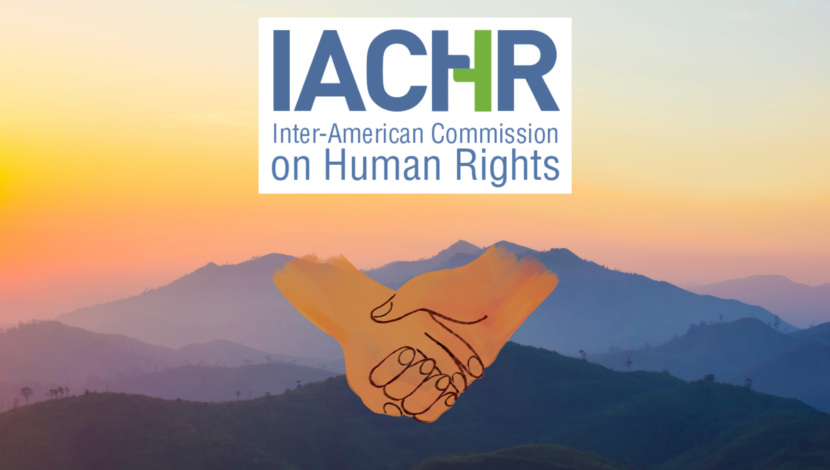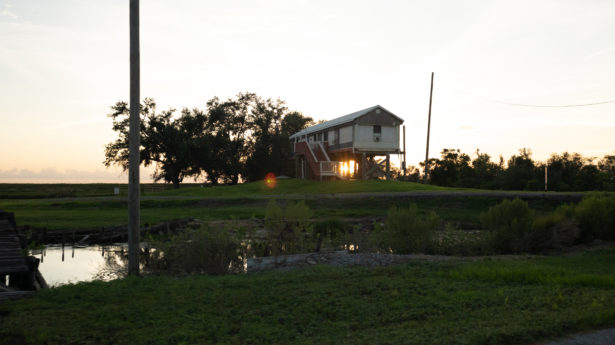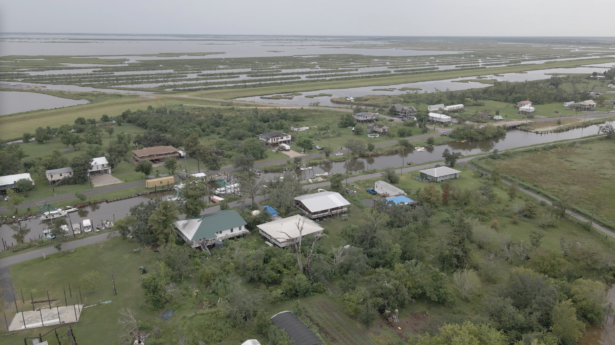The Unitarian Universalist Service Committee advances human rights through grassroots collaborations.
Tribes’ Leadership Brings Climate Crisis to International Forum

By Deanna Johnson on November 4, 2022
Indigenous tribes within the United States remain structurally and systemically violated by the federal government. This is especially true for the at least 400 non-federally recognized tribes throughout the nation. For these tribes, federal support is scarce and fails to adequately respond to the needs of Indigenous citizens in community-informed and sustainable ways.
On October 28, Professor Patty Ferguson Bohnee and Chairman Donald Dardar of the Pointe-au-Chien Indian Tribe, Elder Chief Shirrell Parfait-Dardar of the Grand Caillou/Dulac Band of Biloxi-Chitimacha-Choctaw, Chief Albert Naquin of Jean-Charles Choctow Nation, Elder Chief Rosina Philippe of the Atakapa-Ishak/Chawasha Tribe, and Millie Hawley of the Native Kivalina Village spoke before the Inter-American Commission for Human Rights on the injustices carried out by the U.S. government against Indigenous communities living on the frontline of climate-induced disaster.
IACHR Hearing
Tribal leaders were given a mere 20 minutes to summarize generations of lived structural violence and neglect. They detailed the federal government’s failure to adequately provide its citizens with resources to mitigate and adapt to extreme ecological destruction in their communities. Moreover, the leaders spoke to the barriers they have experienced when trying to secure federal relocation support and post-disaster assistance in the wake of major land loss through permafrost and ice melting, flooding, and major storms. Despite the limited amount of time given for testimony, the leaders succeeded in highlighting their most pressing concerns and presenting a moving and compelling case to the commission.
Three U.S. government officials were also in attendance, representing the Department of State, Environmental Protection Agency (EPA), and Department of the Interior Office of Indian Affairs. While the State Department representative cited the United State’s, “commitment to honoring the principles of tribal sovereignty and self-determination,” he and his colleagues failed to lay out any concrete actions for ensuring the federal recognition of all Indigenous Tribes to ensure support for frontline communities. Further, the State Department underscored the non-binding nature of the 2016 American Declaration on the Rights of Indigenous Peoples, which lays out the rights that the countries of the Americas must uphold in commitment to the First Nation peoples whose land we occupy. Though the current Biden administration has implemented initiatives dedicated to addressing the needs of federally recognized tribes, none of those federal programs or funding opportunities are available for Indigenous groups unrecognized by the federal government. This leaves thousands of Indigenous citizens without mechanisms to protect their homes, families, environment, culture, and health.
What Does This Mean?
This hearing represents a huge win for the tribes. Not only was this hearing just the fourth to be had before the IACHR on climate change, following the hearing the commission requested an informational report and site visit to further investigate the human rights breaches within Louisiana and Alaska. These actions comprise three of the four possible steps the commission can take when an issue is brought before it. After the site visit and report review, the commission will subsequently publish its observations, informing future diplomacy and encouraging international pressure. The report has already been submitted
You can see a recording of the public hearing here.
Additional Advocacy Events in Washington
In addition to the IACHR hearing, the tribal leaders, EarthRights, and UUSC held a congressional briefing alongside U.S. Senator Ed Markey of Massachusetts about climate disaster mitigation and adaptation support for Indigenous communities. During the briefing, the group presented six recommendations to Congress in support of Indigenous communities’ rights to protection and disaster mitigation and adaptation. They are:
- Increase funding to federal programs targeting the needs and vulnerabilities of frontline communities facing displacement.
- Make federal funds more directly accessible to the Indigenous communities that need them.
- Amend the Stafford Act to recognize slow, ongoing climate-induced environmental changes as major disasters.
- Work with community-led groups to develop institutional capacity to assist communities.
- Create a new cabinet-level position focused on climate-induced resettlement.
- Support policies addressing global loss and damage at COP27.
A recording of the briefing can be found here.
From November 6-18, the 27th Conference of Parties will be held in Egypt. During the conference, the U.S. government is expected to commit to supporting its Indigenous citizens by supporting various climate change initiatives. Stay tuned and follow UUSC on Instagram, Twitter, and Facebook for updates on the event as we hold the United States accountable.
Image Credit: IACHR; UUSC

